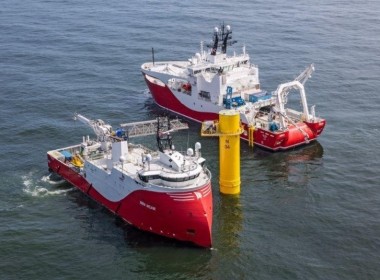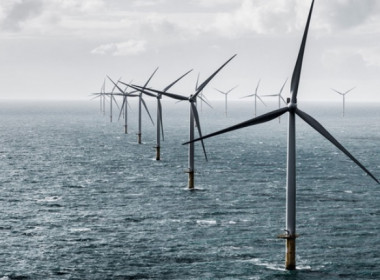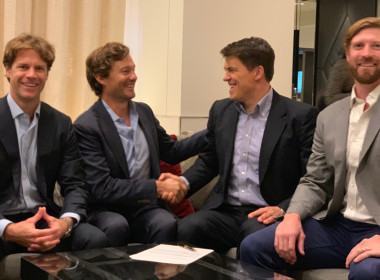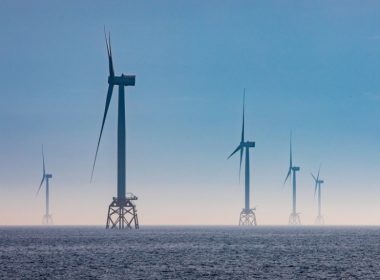COLUMN | Quick updates: Total buys a rig; Trident cans a rig; Standard sales succeed and fail; Saipem wins and loses corruption battles; Sapura hit with wind arbitration [Offshore Accounts]

Gong Xi Fa Cai, Kung Hei Fat Choi, and Chúc mừng Năm Mới! Happy Lunar New Year to all our readers, and welcome to the Year of the Dragon.
At least, this is one time of year where nobody will be sneaking abandoned offshore rigs and supply vessels out of Chinese shipyards to the market as all the shipyards are closed.
But elsewhere in the world, business continues as usual – there a spate of deals (and non-deals) to report this week.
Total buys a rig
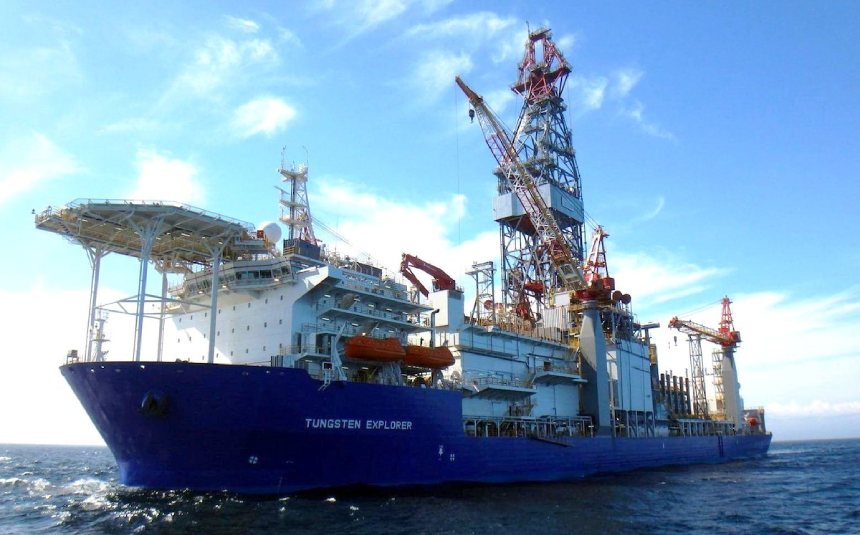
Last week, Total showed a markedly Middle Eastern trait. It paid US$199 million for a 75 per cent stake in the deepwater drillship Tungsten Explorer from Vantage Drilling, which will retain the operatorship of the rig on a long-term charter in West Africa… with Total.
The rig is already on hire to the company drilling in Namibia working on the Mangetti-1X well, and is now set to be extended for much longer. Total has granted Vantage a 10-year management contract over the rig. This is the single most important story of the year so far for offshore, more important than Woodside not buying Santos, and more important than platform supply vessels (PSVs) hitting over US$30,000 per day in international markets for term charters.
The sale is important because it tells us that Total sees no drop in day rates for deepwater rigs, which are already over US$500,000 for short-term duration fixtures, and in the high US$400,000s for longer-term fixtures.
As it stands, the economics of the deal look favourable to both parties. The Vantage rig probably costs around US$180,000 per day to operate in cash terms, so we can assume that the fixture would be in the region of US$460,000 (or a conveniently rounded US$100 million a year of free cash flow to the owner). Therefore, Total should get a three-year payback on its investment, which is decent by any measure, and it can pick and choose where and how it deploys the rig, and it is insulated against further price hikes. It knows the rig well and has chartered it for several years, most notably in its first, unsuccessful effort to find deepwater gas off Lebanon in 2020, before bringing it to Africa in 2023.
If the French major foresaw a surplus of deepwater units, it would not be doing this. The transaction is also very supportive to the valuations of all the major deepwater drilling rig owners, setting a US$267 million price on a sixth-generation rig that is by no means the best or brightest of its kind.
What is the next pivot for asset-light Vantage?
Lutricia McNeal worried about being Stranded. Vantage is certainly operationally stranded now, with a fleet of just two jackups and one drillship remaining, but it is debt-free at long last.
We have long argued that Vantage Drilling would sell its assets and eventually disappear as part of industry consolidation. We maintain this view, and consider Exmar’s recent purchase of a stake in the company purely speculative.
A long battle to get a clean balance sheet
Vantage entered the industry downturn in 2014 with US$2.7 billion of debt and a fleet of only seven rigs. It promptly entered into a restructuring agreement in late 2015 after Petrobras terminated an eight-year contract for the drillship Titanium Explorer amid lurid allegations of bribery by a Vantage shareholder, but not the company itself. The involvement of Today Makes Tomorrow founder, disgraced and bankrupted shipping “tycoon” Nobu Su of Taiwan, whose turbulent life would warrant a sensational book of its own, gives the Vantage story plenty of spice.
Petrobras alleged that Vantage had breached its obligations under the drilling contract, but Vantage took the Brazilian state oil company to arbitration, and, amazingly, won, with Petrobras paying out US$622 million in damages and US$112 million in interest in 2019.
Contractor beats oil company in arbitration
These funds were promptly used to cover operating losses and to pay Vantage’s long shareholders (its former creditors from 2015) a US$525 million special dividend. In 2021, the company sold Titanium Explorer for scrap for just US$13.5 million after five years in lay-up. Burdened with over US$345 million in debt and a long-term, cash break-even contract with ONGC in India for its second drillship Platinum Explorer, the company was compelled to sell three jackups to Saudi-owned upstart ADES in early 2022 for US$170 million. Crucially, Vantage maintained management of the rigs involved, being Emerald Driller, Sapphire Driller, and Aquamarine Driller.
Hello Aquadrill, goodbye Aquadrill
The pivot to management took another turn in late 2021, when Vantage struck a deal to market and operate two deepwater semi-subs and two DP drillships for Aquadrill, the former Seadrill Partners, which had been restructured into the ownership of its creditors and had removed its drilling rigs from Seadrill’s legacy management contracts. That was great for Vantage… until the end of 2022 when Seadrill announced it was buying back Aquadrill and would be cancelling the third party management agreements on the Aquadrill rigs and taking them under its own control once again.
Small is beautiful?
So now, debt-free Vantage hangs on with the management of its own three remaining rigs, the three shallow water rigs for ADES, which are working in Qatar, and the Tungsten Driller for Total. That doesn’t look very viable to me in the long-term, as there are few warehoused deepwater rigs left to which it could plausibly take over management, neither in China (West Draco and West Libra) nor in Singapore (Can Do). Dolphin Drilling has already managed to gain rights to market the two harsh-environment units being built at Seatrium in Singapore, which were ordered by Awilco at Keppel, but then cancelled amid a welter of lawsuits and counter-claims.
Newbuilds seem a distant prospect unless deepwater rig rates surpass probably a record US$700,000, and Transocean is still sitting on seven laid-up, high-specification units, whilst Valaris just took delivery of two very much delayed newbuild units from Korea. So there is still some capacity out there, even if reactivating laid-up rigs is a US$64 million task, as Deep Value Driller demonstrated – and its unit was never cold-stacked for years, unlike the Transocean units. So, Vantage is trapped strategically, unless it is part of a consolidation play.
Selling the rig to Total is good news for Vantage’s remaining creditors and for its shareholders. Deep Value Driller showed that debt-free single-rig companies can be surprisingly successful investment vehicles in a rising market, and a marriage between Vantage and Deep Value Driller would not be out of the question, in my humble opinion.
Trident terminates a rig in “timing change”
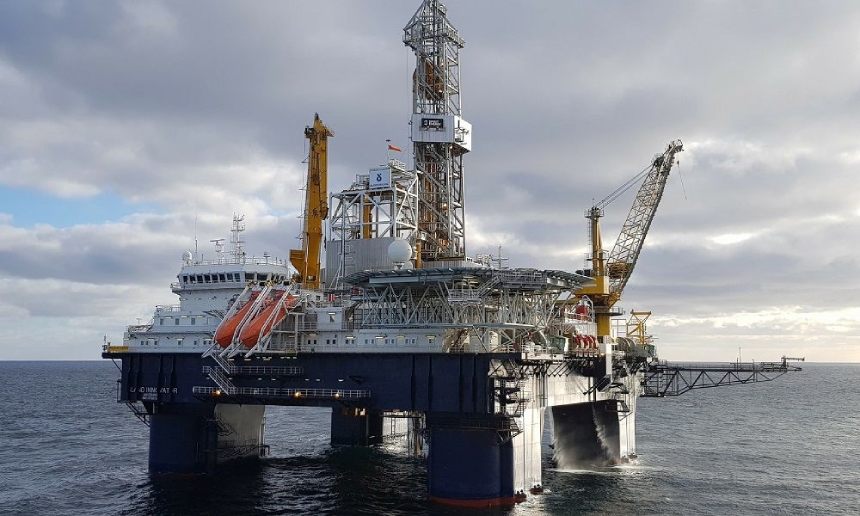
In a market short on rigs and boats, Trident Energy in Equatorial Guinea just did something rare in the current bull market: it cancelled the semi-sub Island Innovator for cause in the middle of the first well of Trident’s three-well programme in Block G to reinvigorate production at its aging Ceiba field. The rig had only arrived in the country in November last year under a two firm and five option well programme, and Trident had already optimistically declared some of the options. Ain’t that just the way life goes down, as Ms McNeal once sang?
Unfortunately, Trident’s partner Panoro said that there were issues with the Island rig’s blow out preventer (BOP) and that safety concerns meant that the rig could not continue. In a press release rather benignly titled “Timing Change” rather than “Rig Cancelled due to Safety Fears”, Panoro’s CEO, John Hamilton, stated bluntly that the joint venture “will not compromise on safety, which is of paramount importance, and has acted decisively and responsibly in taking this course of action.”
This very strong safety message was then somewhat undermined by his follow-on comment to reassure the stock market: “Based on… current estimates, the pause in drilling is not expected to affect Panoro’s shareholder distributions, financial, and operational targets for the year. The postponement of the drilling campaign results in a more beneficial phasing of capital expenditures on a group-wide basis.”
That’s okay then, although if Trident and partners have to take the Diamond semi-sub Ocean BlackRhino after it completes its brief one-well programme in nearby Guinea Bissau in the middle of this year, they may end up paying considerably more than they had contracted the Island rig. That rig was fixed at a leading edge rate estimated at US$514,000.
Bad news is good news
Given that BOP failures were at the heart of the Deepwater Horizon disaster in 2010, this cancellation suggests that the industry is learning from its mistakes. Thank goodness. The Deepwater Horizon disaster occurred when the BP-chartered, Transocean-operated rig suffered a catastrophic blow out on the Macondo well in the Gulf of Mexico, sinking the rig in a fireball that killed ten people and spilled record amounts of oil into the sea from the stricken well. That incident cost BP over US$50 billion in fines and damages, and led to the resignation of its CEO, whilst Transocean reached a settlement with the American authorities for a couple of billion dollars but avoided criminal charges.
BOP disconnection problems also saw the Diamond semi Ocean Great White stop operations in the UK West of Shetland last week. The harsh-environment rig dropped its lower marine riser package onto the seabed accidentally after disconnecting from the BOP to wait on weather. The video of the incident and a summary of events is on @MugsLuck on X (formerly Twitter) here.
Standard problems?
One company that will be directly impacted by the Trident cancellation is Capital Offshore, the newly formed PSV-owning wing of Greek shipowner and football club baron Evangelos Marinakis, which bought the large 2019-built PSV Standard Defender as part of a three-vessel deal worth over US$72 million. Standard Supply had sent the DP2 PSV of UT 717 CDX design, with 4,200 DWT and 900 square metres of clear deck, down to Equatorial Guinea to work for Trident for the duration of the three well campaign. Standard Defender was subsequently sold to Capital in mid-December as part of the en bloc deal.
So, Mr Marinakis may be learning early the capricious and inequitable nature of the offshore supply vessel (OSV) industry, where contracts can be terminated for no fault of a vessel owner, and “firm” rarely means firm.
Supplier not supplied on closing
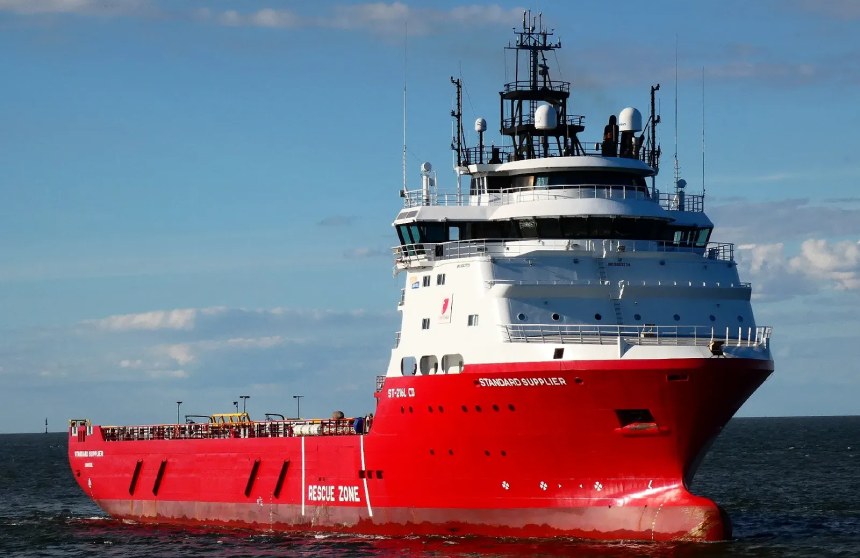
Capital has also hit problems closing on the third vessel in the trio. That closing unraveled on January 17, when Standard announced to the stock exchange in Oslo that it was unable to meet the delivery requirements on the 2008-built DP2 PSV Standard Supplier due to ongoing and uncompleted repairs on the vessel’s Azimuth thruster. The company reported that the vessel had been off hire since late October due to repair on an azimuth thruster, but Capital cancelled ahead of a return to service proposed by the owners later in January.
Standard Supplier is chartered to BP UK at a rate of around US$23,500 up to June 2024, with options for another three months reflecting the extended breakdown time, a great deal for BP as it gets very low rates on the ship for the critical North Sea summer season this year, but can spot charter in tonnage for less than the US$23,500 day rate from Aberdeen now, if it needs a replacement vessel.
Suppliers disappoint many owners
If ever there was a sign that the European supplier base for PSV equipment is stretched after years of neglect and cost-cutting, this was it. Three months and a cancelled sale are a high price to pay for a supply chain that was shrunk by the industry’s years of depression.
The vessel is now being recirculated for sale by Standard in the mid-US$20 million range. Let’s hope that major equipment and engine suppliers can up their game, because those who cannot service their existing customers in a timely manner should not be winning new orders in the inevitable next building cycle. I am thinking of certain Nordic suppliers here, especially, but I will not name names. In any case, the industry is watching and the levels of inventory, customer service, and technical support from some of the biggest names of their OSV customers is lamentable.
Saipem both acquitted of and convicted of corruption
Depending on where you looked recently, there was good news and bad news for Saipem on the corruption front recently:
I present the following links with no comment:
- The press release of February 8 titled “Algeria: full acquittal of Saipem Contracting Algérie in the criminal proceedings related to the GK3 project.”
- The press release in December titled “The Brazilian administrative authority Controladoria-Geral da União (CGU) has issued against Saipem and Saipem do Brasil a sanctioning measure for the temporary suspension from contracting with the Brazilian public administration following the proceedings.”
Whilst some may take the attitude of “you win some, you lose some,” I would observe that having two major corruption cases against the same company come to a head in just three months doesn’t look very good.
We wish the company well in getting its house in order. The optics just aren’t good, especially when in Australia, the company has faced serious operational issues with its premium, high specification pipelayer Castorone.
I refer you without comment to the press release of January 31 titled “Saipem, no damage to the Castorone vessel. Remediation works are underway.”
That’s before the 14 per cent fall in the company’s share price due to the cancellation of several key projects in Saudi Arabia. As Lutritia sang herself “Someone loves you honey”.
Sapura hit with big claim… in Germany, about Taiwan
The length of time it took Vantage to be vindicated in the arbitration and appeals battle with Petrobras (five years) and the length of time Saipem’s corruption cases have been swirling around in Brazil and Algeria are a reminder of how long and hard it can be for companies to shake legal issues. Indeed, last week we highlighted how SBM Offshore is still slugging it out in court against its whistleblower Jonathan Taylor, twelve years after he first called the company out on its first corruption claim in Equatorial Guinea.
Now Sapura Energy, the Malaysian offshore construction company wrestling with both a long and difficult restructuring and asset sales, has been hit with just what it didn’t need: a €50 million (US$54 million) claim from disgruntled customer Yunneng Wind Power, a Taiwanese wind farm operator. Yunneng is jointly owned by Skyborn Renewables, a subsidiary of private equity house Global Infrastructure Partners, and Thailand’s Electricity Generating Public Company (EGCO) with each one holding 25 per cent stakes, TotalEnergies holding 23 per cent, and a consortium of Japanese investors holding the balance. The arbitration will be under German law, as the consortium was originally headed by WPD of Germany.
2022 background to the case
In February 2022, Sapura terminated a contract with Yunneng to transport and install foundations for the 640MW Yunlin offshore wind farm. The contract had been awarded to Sapura Energy’s wholly owned subsidiary, Sapura Offshore, in March 2019. This came a few weeks before Sapura reported a loss of over US$2 billion for its 2021 financial year, one of the biggest losses in Malaysian corporate history.
The Yunlin project should have been completed in September 2020, but unfortunately, technical and operational issues, which Sapura Energy says were certainly outside its control and were most definitely not its fault, had pushed the completion back to September 2023, more than a little late. Faced with bleeding cash or walking, financially very vulnerable Sapura chose to terminate the contract and walk away.
“Negotiations with Yunneng to remedy the breach began in November [2021],” Sapura Energy CEO Datuk Anuar Taib said in a statement at the time, describing how conversation had run dry with its client. “Since we exhausted all avenues for an amicable solution, we made the tough decision to terminate the contract in the best interest of the group.”
At the time of the termination, only 16 of the 80 monopile foundations for the 8MW turbines Yunlin needed had been installed by Sapura. Yunneng asserts that Sapura had been “unable to deploy the relevant installation vessels required to conduct the installation of certain structures on time.”
This is a reminder that the price of failure in offshore can be high (just in case anyone needed one), and that legal remedies are expensive and time consuming to obtain. Margins in offshore wind projects are wafer-thin and operators are under serious cost pressure – whether turbine makers like beleaguered Siemens Energy or windfarm operators like Ørsted (which announced this week it was suspending its dividend, cutting 800 employees and abandoning all projects in Norway, Spain, and Portugal).
So, faced with four years of delay off Taiwan, and seeking refinancing for its project last year, Yunneng is not in a happy place. But then, neither is Sapura. In December last year, Reuters reported that 75 per cent of Sapura’s multi-currency creditors holding its loans valued at total US$2.2 billion had approved a restructuring plan. Sapura also has to resolve around MYR1.5 billion (US$320 million) of other outstanding claims from suppliers and subcontractors, which have been frozen as part of its Malaysian judicial restructuring process. In the third quarter of 2023, the company reported profits of just US$6 million, so it can ill afford another cash bleed if it loses to its former Taiwanese customer, just as it finally seems to have reached an agreement with its creditors and a found a way forward.
Let’s see what the Year of the Dragon brings.
Background Reading
A gallery of Vantage’s rigs can be found here.
Specifications and more information on Island Innovator are available here.
Our coverage of the large egos and large losses involved at Sapura Energy can be found here.


